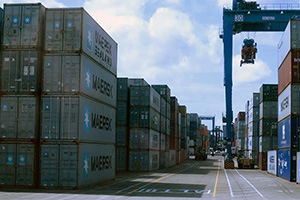By Jessica Domel
Multimedia Editor
President Donald Trump is making good on a campaign promise to renegotiate the North American Free Trade Agreement (NAFTA).
In early February, Trump consulted with Congressman Kevin Brady of Texas on the deal. Brady is chairman of the House Ways and Means Committee, which would be tasked with reshaping NAFTA.
Following the meeting, Brady told reporters the meeting was constructive. He said the president wants to build upon NAFTA and create more American jobs, according to the Houston Chronicle.
NAFTA is now 20 years old, and much has changed since it was first signed, according to Veronica Nigh, economist for the American Farm Bureau Federation (AFBF).
“There’s probably some room to make improvements to the agreement,” Nigh said in an interview with the Texas Farm Bureau (TFB) Radio Network.
NAFTA negotiations began in 1991. The trade deal was implemented slowly from January 1994 through January 2008. The agreement provided elimination of most tariffs for traded products between the U.S., Canada and Mexico.
According to Nigh, NAFTA is beneficial to the U.S. because both Mexico and Canada are consistently in the top three destinations for American products.
“Canada and China trade off whether they’re one or two, and Mexico has consistently been the number three market. From the beginning of implementation to last year, U.S. ag exports to Canada and Mexico have quadrupled,” Nigh said. “For Texas, as an individual state, you all exported $4.4 billion worth of ag products to our NAFTA partners, which is about 50 percent of all exports out of Texas globally.”
AFBF supports free and open trade, and NAFTA has opened many opportunities for agriculture.
“It’s an incredibly important market. If we are thinking about having a renewed discussion on NAFTA, we would much more prefer it be some changes rather than exiting the agreement in total. As we well know, since 1993, a lot has changed,” Nigh said.
Biotechnology has changed since the 1990s and would need to be addressed in a new trade agreement, as would other issues that have arisen since.
“Certainly there are some cross border issues as to how products actually cross our physical boundaries that could use some updating,” Nigh said.
Issues related to sanitary and phytosanitary rules may also be modernized.
“There are a lot of rules based in definitional type issues that we could improve, but on the tariff side, we’re already enjoying almost entirely free access. We want to certainly ensure that continues as we renegotiate this agreement,” Nigh said. “It certainly seems that the administration understands the importance of trade to agriculture. We continue to make that point, as do a lot of other agricultural organizations. The renegotiation seems to be focused much more on the non-agricultural side of the economy.”
Although renegotiation is preferred, opening the deal could mean changes that would have a negative impact on agriculture.
“We have to remember that a renegotiation means everyone gets to air their grievances with the agreement. Perhaps Mexico and Canada have some issues that they would like to address as well. Some of those might be agricultural. With an agreement that’s over 20 years old, there’s lot of things related to ag trade that could be updated and maybe improved,” Nigh said. “We’ll have to keep an eye on it and make sure we take advantage of that opportunity, but don’t get traded off against other industries that maybe we’re more eager to make improvements on.”
In late January, the president of Mexico was scheduled to visit Washington, D.C. to discuss the renegotiation of NAFTA. He cancelled the trip following President Trump’s announcement regarding the building of a border wall between the two countries.
“Technically, those two issues are not linked. Though, certainly Mexico is taking all of these issues together and is thinking about them in the larger sense about what the relationship with the United States means,” Nigh said. “I think we have to be careful and think about all of these issues as they’re linked together. It’s oftentimes, even from a policy perspective if they don’t seem linked, they can often become linked when those issues are discussed in rapid order.”
As for Canada, they continue to remind everyone how i


Re: border wall and your line “Technically, those two issues are not linked.” Technically they are linked! Our President is jeopardizing our relationship with Mexico, which has been highly advantageous to Texas farmers. This wall is bad for Texas as a whole (not just farmers, but our whole economy), and farmers need to make that clear to President Trump and their representatives in Congress before Trump delivers his 5th bankruptcy.